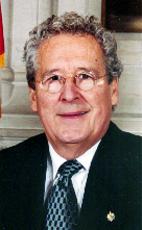Mr. Speaker, I would like to congratulate the member for Lac-Saint-Jean--Saguenay for his motion, which I would like to read to the House. The motion asks, and I quote:
That this House call upon the government to review its international aid policy with a view to substantially increasing the funds available for Canadian humanitarian aid, particularly in the context of the military interventions in Afghanistan, and to increasing the level of its aid for development to 0.7% of GDP, as recommended by the United Nations.
I had the pleasure of acting as parliamentary secretary to the Minister for International Cooperation for two years, between 1999 and 2001. I witnessed the fact that the minister is dedicated to helping those in need and wanted to increase humanitarian assistance. Formerly, CIDA's assistance was mostly focused on building infrastructure, such as bridges and dams. More and more now, it is directed toward humanitarian assistance.
Last year the Minister for International Cooperation announced that her department and the Canadian International Development Agency would strive to direct their programs toward the four priority areas of social development: health and nutrition, basic education, the fight against HIV and AIDS, and child protection. I would like to congratulate the minister for this new direction.
I am pleased to support the member for Lac-Saint-Jean--Saguenay in our common objectives for international co-operation. Through our Prime Minister, Canada has committed to fulfilling the development objectives for the millennium.
These objectives include access to education for all boys and girls around the world, reducing the number of children who die of preventable diseases, promoting gender equality and eliminating extreme poverty and hunger.
Canadians are concerned about what is happening to children on the planet. What is being done, or rather what is not being done now to protect these children will have a catastrophic effect on their lives and a severe effect on our own future.
The Canadian International Development Agency, CIDA, takes these concerns very seriously. It has developed an action plan for children, children who require special protection, children who are often exploited, abused and discriminated against. Its plan is aimed at all boys and girls growing up in the poorest countries of the world and who are directly threatened by the most serious dangers.
With this plan of action, CIDA is launching a new and better approach, which places Canada on the frontline of world action for the protection of children. The agency does not limit itself to answering the needs of children who are usually forgotten, it also wants to ensure that the rights of those children are recognized and respected. Respect for the rights of children is the key to a real and sustainable change in the life of those children and communities. This is positive action for development, an good way to eliminate the root causes of poverty and exclusion.
Children who have to work and who are affected by war are those who benefit from the initiatives of CIDA for children protection. Those initiatives are a complement to the agency's efforts for all children in other areas, namely in health and nutrition, basic education, the fight against HIV and AIDS. CIDA has committed $122 million for the protection of children under a five year action plan.
Since the world summit for children, which was held in 1990, Canada has taken the lead of the children protection movement.
We have also played a key role in the development of international agreements on the rights of children, whether it is for children forced to work, sexually abused children or children forced to become soldiers. When the government hosted the international conference on children affected by war last autumn in Winnipeg, we pioneered by inviting children to play an active part in the debates and decisions.
The government has also obtained the support of the retired Lieutenant General Roméo Dallaire as a special adviser to the Minister for International Cooperation on the issue of children affected by war. The practical experience of the general will be most useful to CIDA, in terms of its program and will allow us to bring this question to the attention of the public.
With the House now debating our overall program of humanitarian and development assistance for countries less privileged than ours, including Afghanistan and other countries in southern and central Asia, we must ensure that the emphasis remains on children.
The future of societies torn apart by war lies in the ability of communities and parents to pass on to their children values such as peace, tolerance and respect for others, even if these children have often witnessed horrific acts. The success of these societies will have an impact on our own safety and stability. These people deserve our support and our assistance.
Canada should be able to provide greater support for this sort of initiative. This is why we will be supporting the motion before us today.

